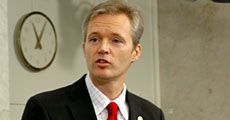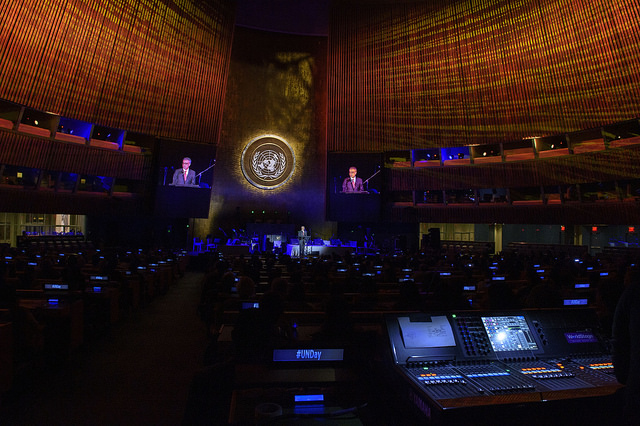Priorities (Defence) of the future Swedish EU Presidency

In terms of defence, the next six months of the Swedish EU Presidency will certainly be more active than the current six months. That will change after the "snooze" of the Czech presidency! (Literally as well as figuratively).
For a Europe as a global player
Sweden intends, in fact, to promote its "strong commitment to ESDP development"in line with"its international commitment to peace operations within the framework of the UN"And"strengthen the role of the EU as a global player"as the Swedish ambassador in Paris has just recalled, before the WEU, at the beginning of June (1)."It is not a question of strengthening the militaristic aspect of the EU but of having more ambitious missions at the level of peacekeeping" specified the Swedish Defense Minister, Sten Tolgfors (2). It should be noted that the theme of "Defence" in Sweden is not a trivial subject. Internally, the country is in fact initiating a strategic change with a desire of the government to get closer to NATO and modernize the capacity of its armed forces.
The priority: military capabilities, and especially battlegroups, and civilian capabilities.
Concerning the European Battlegroups, the evolution seems necessary and Sweden, which tested the uselessness of the formula (in 2008 during its on-call tour) is determined to use its presidency to force it to evolve. To avoid seeing the situation repeat itself. (Sweden will resume their shift in 2011. And the Nordic battlegroup preparation has already started...).
Two light intervention groups, of around 1500 men, are on call every six months (the schedule rotates between the Member States). But they were never used. It is not for lack of preparation (some prepare very seriously, notably the Nordics) or needs on the ground (in Chad for example before the Eufor mission or in Congo where the EU finally decided not to intervene). But rather convenience. Let's be clear: we have a beautiful toy and we carefully put it back on a shelf so as not to damage it... This subject is important and deserves a detour. Otherwise we can put these "battlegroups" in the rank of useless inventions! (NB: it's me who says it and not the presidency. But in private some soldiers do not hide to be even more brutal).
For Sweden, it takes "start discussions to have a more flexible vision of their job" on the ground. It is a question - specifies Tolgfors - "to study all the possible evolutions: the type of situations that a Battlegroup has to face, the use as a strategic reserve or for the generation of force, the exchanges of information and a better cooperation, the financing (what part of the budget may cover entry fees, etc.)".
Regarding civilian capabilities, the priority is to strengthen the availability of personnel - to have qualified personnel in sufficient numbers.
A busy agenda on the operations side
On the operations side, Sweden will have to manage the extension of the operation Atalanta off Somalia (and the Seychelles) against pirates, its extension, depending on the situation on the ground, totally changing. There "new generation of force should be started in September for the continuity of the operation"explains on the Swedish side. It will also be a question of studying the reinforcement of the "cooperation with the forces already present" (NB: NATO, CTF, ...). "It is necessary not to duplicate the forces". And, above all, the "possibilities for stabilizing Somalia: the strengthening of institutions (to be studied with the European Commission which is an integral part of this subject), the mission of training security forces". Whose situation remains dire.
En Bosnia, so timing is crucial. The evolution of Operation Althea must be decided. if "theoption 3 of a force with a "non-executive" mandate is recognized as necessary by most member states, there are still many differences", recognizes the Minister. "Some States consider that the time to leave the region has not come". He is "important to take into account all considerations including safety" he adds. And, "Above all, the two questions must not be linked, the military operation and presence and the continuity of the post of High Representative of the international community.".
La Georgia will also be the focus of concern. If the situation has stabilized, frozen, the risk of border incidents remains with South Ossetia and Abkhazia. And the internal political situation is still unstable. The EU special representative in the Caucasus, Semneby, is Swedish. And in European circles, one senses the interest Sweden has in the Caucasus, a test region for EU relations with Russia. Another priority subject of the Swedish presidency.
Even though Middle-East is rarely mentioned officially, we can be sure that it will quickly return to the forefront of the political agenda (especially since the American evolution on the Israel-Palestine question is asserting itself day by day). In this context, the deployment of Eubam Rafah - still blocked - could quickly return to the scene. The two EU missions in the region, which
have begun to be strengthened, could also be in the discussions: Eupol Palestine (towards a rule of law mission on the criminal justice chain and prisons), Eujust Iraq (geographical extension).
Sweden will also have to manage the rise ofEUPOL Afghanistan - in a risky electoral context - while the workforce is still not complete.
In short... We won't have time to get bored. Note that the presidency is preparing very seriously. Expert visits have been taking place in Brussels for several months now. The Minister of
Defense has already met several of its counterparts (German, Polish, etc.). And the Swedish diplomats at the Permanent Representation are determined to get fully involved in all matters.
Le blog of the swedish minister of defense
(1) Speech delivered in Paris, before the WEU Assembly.
(2) Random interview with a few journalists during a visit to Brussels
(3) Read also "how to say no politely to the un"
